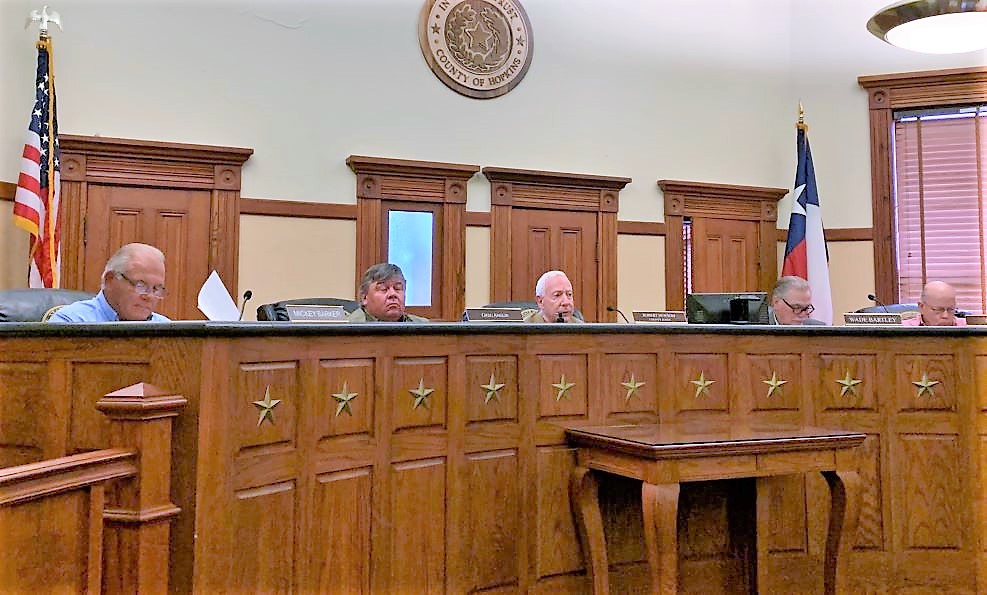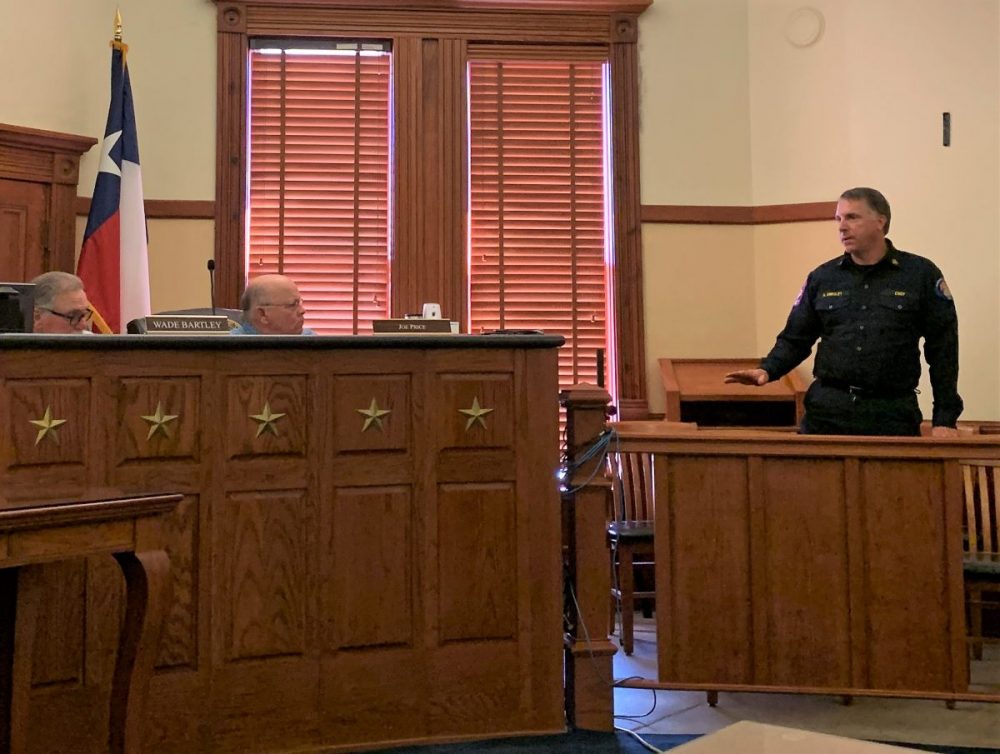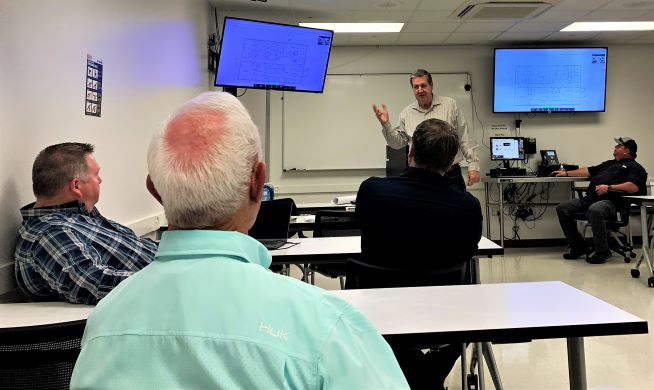Hopkins County Commissioners Court, in a special session Tuesday afternoon, committed the just over $7 million in ARP (American Rescue Plan) funding which has been allocated to the county toward 6 purposes: to assist NETEX, a communications tower, road equipment, salary replacement, a trustee facility and retainage. The Court also approved a security proposal and budget amendments for insurance proceeds received.
American Rescue Plan

“Those allocations will be set into stone today so that we will be able to work around those figures and, I understand there is going to be some give and take on some of those figures. However, that will allow for that money to be set aside to be used for these purposes,” Hopkins County Judge Robert Newsom noted when reading the proposal to obligate ARP funds from the US Treasury.
“They are very strict as to how we use those funds, so that’s why we are using them for these particular projects, because they have met the criteria of what the money was meant for,” Precinct 1 Commissioner Mickey Barker pointed out.
Newsom noted that is correct, plus the allocations have to be somewhat COVID-related.
Road and Bridge, Salaries
“The funds that you state go to road and bridge from that, the guidelines state general economic development and infrastructure projects such as road construction or bridge repair unrelated to COVID-19 are not an eligible expense, UNLESS they are funded through a county’s loss revenue replacement allowance. Hopkins County had a loss of revenue, so that’s why you are able to get those funds,” County Auditor Shannah Aulsbrook added.
Those funds are designated specifically for infrastructure and will be divided into the four county budgets at a later time.
“It is particularly for the purchase of capital assets, not necessarily going on the roads,” Newsom added.
The Commissioners Court allocated $1,719,040 of the more than $7 million in ARP funding for “public sector revenue loss,” to be spent on county general specific infrastructure within the road and bridge area for the purchase of heavy equipment capital assets for construction of county roads or bridge repair.
At least $610,000 of those funds will be used specifically for the purchase of two M314 Excavators from Holt Cat through Sourcewell. One will go to Precinct 2 and the other to Precinct 4. Each commissioner will use their portion of allocated American Rescue Plan funds to pay for the excavators. Each piece of equipment is $305,000, and because the units are being bought through Sourcewell, a purchasing cooperative, the county is not required to go out for bids for the purchase, according to Aulsbrook.
Precinct 4 Commissioner Joe Price said this will be used to replace Precinct 4 tractor that burned up a few weeks ago.

“It says on there an excavator, which may through some people off. It’s an excavator on wheels, on top, so it can go one down the road. This particular model, I can count at least four jobs this machine will do out in the precincts for us. I think it will be well utilized,” Precinct 2 Commissioner Greg Anglin said. “I think this will really be a well rounded and used machine for us, especially on brush-cutting. It has an attachments.”
Anglin said while Price has had a problem recently with his machine, and the precinct 2 brush cutter has been a constant problem since he’s been in office. A more heavy duty machine, the Holt CAT M314 Excavator should hold up better for brush-cutting.
Price said in addition to clearing ditches, the Excavator would have a grade-all and tree brush cutter.
The equipment could potentially be used by Precinct 1 and Precinct 3 crews, provided they are available when the crews would need t use it or other means to accomplish their tasks.
Later in the meeting, Aulsbrook asked the court consider amending the FY 2021-22 budget by moving the $2 million the county has already received from the American Rescue Plan revenue, $500,000 each, into the four accounts for machinery and equipment.
Another $280,960 of the $7 million In ARP funding awarded to Hopkins County was allocated for salary replacement.
Communications Tower
The Commissioners Court allocated $500,000 of the $7 million In ARP funding for a new communications tower in Martin Springs Community, to replace a tower that is estimated to be 55-60 years old that is on its last leg. The tower was refurbished 5 years ago thanks to an Ark-Tex Council of Governments grant. At that point, county officials were told that the measure was a stopgap, a patch that would last only about 5 years, Hopkins County Fire Marshal Andy Endsley told the Commissioners Court.

“We are at that point. So, if were to have a large wind or anything like that it really could come down. That would cripple our communications for our first responders throughout all of Hopkins County and our surrounding neighbors. It’s imperative that we do this. Also, allows for broadband to come in on this,” Endsley explained.
A component of the project to meet the rules and regulations established for funding includes allowing for broadband internet service to expand into the area using the tower.
“We’ve already go a community internet provider that’s on both of our locations and it also opens it up for other competitors if they want to do that,” Endsley said.
That, in turn, would make internet available further in the county, which should help reach some of the gaps in that area, which would allow schools who have students doing online learning from home in the more rural part of the county. That would provide more high speed internet at a pace needed for those students to effectively do school work online.
“We are still waiting on rough estimates to come in on that,” Endsley said.
Trustee Facility
The largest allocation from the $7 Million in ARP funding awarded to Hopkins County was designated for construction of a building to house male inmates who have been designated as “trustees,” and as such go out into the community to work daily, including on precinct crews, at schools, the Civic Center and other locations throughout the community.
The new $4.5 million housing facility would better segregate the inmate trustees from the general inmate population when they return from their work details, a measure to reduce potential spread of COVID or other infectious illnesses from the trustees who are out in the public or working alongside those who are around others in public, where they could be potentially exposed to illnesses, county officials pointed out.
By doing so, the county would be meeting the “response to COVID pandemic for public health and the health of the general inmate population of the Hopkins County jail,” according to the motion approved by the court for all six funding purposes.

County Commissioners, Sheriff’s Office, Fire Department and Jail representatives met with DRG Architects, LLC, following the regular court session to discuss the new Hopkins County Trustee Housing Facility, to be located on Houston Street, across from the Hopkins County jail. DRG, who also oversaw construction of the new Hopkins County jail, presented schematic drawings that were drawn based on prior conversations with county officials. The schematic plan has been submitted to the state jail commission for approval, the first of three submittals. DRG, once approved, will then work with the county on developing a design, and once approved will submit that as well. They also will submit for approval plans for the construction phase of the project.
Typically, a team including representatives from the court, sheriff’s office and architectural firm go before the state officials for an initial contact meeting. While COVID measures are lifting, it’s unclear whether the agency will continue visits via Zoom or otherwise for those sessions, the DRG representative noted.
As proposed in the DRG proposed schematic, the facility would house up to have three dorms with 12 beds each like a general population area, and two single cell pods with six singe-bed cells each. The new trustee housing facility would have an enclosed exercise area along with a warming kitchen with with three compartment sink, carts, work tables but no real cooking facilities are standard for these types of facilities. The need for refrigeration and likely microwaves was discussed.
A receiving area on the side of the building would allow vehicles to pull up to a fenced area with a covered awning to pick up inmates assigned to work crews throughout the county. However a number of matters will need to considered and decisions made regarding use and equipping of entry areas to reenter the jail housing. Discussed was the potential for a locker room/dressing area off the receiving area and a body scanner and possible shower at the inmate entrance.
Visitation, counseling, multipurpose, reception/lobby, office and other spaces within the jail too were discussed. For instance, the officials considered what visitation areas would need to consist of and whether visitation would be conducted at the cells or a multipurpose room that could be used for education, training and special programs and religious observances.
Overall, security for the inmate trustees, officers and visitors is to be paramount, with consideration given for inmates’ medical and mental health needs as well, and possible areas that could be converted or reconfigured in the event of an outbreak of illness among trustee inmates, and the long-term needs for a facility of that size, including possibility of housing female inmates at the location.
NETEX Rail
Barker, who serves on the NETEX Board, reported $25,225.94 of the $7 million In ARP funding was allocated to NETEX (Northeast Texas Rural Transportation District) will “help replace cross ties on the failing rail that we are experiencing right now.”

“This will be a good boost to at least get them in the right direction,” Barker said. “We are the first county of six to do this. I plan on encouraging the other counties to help out also.”
In late September Barker proposed donating two semi loads of crossties to NETEX to help support Northeast Texas Connector’s (NETC) repair efforts. NETC, a division of Freedom Rail Group, which has served since July 1, 2020, as operator of NETEX rail, which spans 65.6 miles of operational railroad along an 88.8 mile corridor that runs from east to west through 6 counties, starting in Winfield in Titus County and continuing through Franklin, Hopkins, Delta and Hunt Counties to Mesquite in Collin County.
The NETEX Board meets the first Thursday of each month at 1:30 p.m. in the Sulphur Springs Economic Development Corporation offices.
Retainage
Another $177,806.06 of the $7-plus million in ARP funding will be held as “retainage,” to be used if needed to fill in as necessary for all of the other projects, according to Newsom.
“We haven’t received all the bids back on all these projects. Once we get the bids back, we’ll have firm numbers, but we put some in retainage just to be on the safe side,” Aulsbrook said.
Other Business
Aulsbrook also presented and received court approval for budget amendments insurance funding, to close out the 2020-21 budget year which ended Sept. 30, 2021 and get everything in the proper fund in the current budget, which began on Oct. 1, 2021.
The county received from Texas Association of Counties $2,266.38 for a sheriff’s office truck damaged last year. The funding received for the repairs would be reflected in the department’s vehicle repair and maintenance fund.
The county also received $222,917.09 from TAC for hail damage sustained at the County Annex Building. Quite a bit of that had already been paid for. That would be moved to courthouse repairs and maintenance fund. Part of it will roll over into the new budget.
The county too was awarded $7,056.50 in insurance funding for roof replacement at the County Annex Building. That too will go into the repairs and maintenance fund in the 2021-22 budget.
Another item requiring a budget amendment moves $39,000 from the sheriff’s office commissary fund the maintenance budget for the maintenance truck. The truck was sold to the sheriff’s office. HCSO paid $39,000 for the maintenance vehicle. That funding was moved into the truck maintenance budget, to pay for the new truck.
Also approved was a security proposal with Firetrol Protection Systems for Hopkins County buildings.
“This is just a routine update on the existing contracts we already have with Firetrol. In the past we had several different venders that were duplicating work. We eliminated that by going with one sole source. They do all of our fire suppression, fire extinguishers, fire alarm monitoring and also the security of our buildings. This one only pertains to the fire protection, where they come and inspect our sprinkler systems, fill the backflow, preventers do a flow test on our sprinkler systems within our county buildings and the fire alarm side of it,” Endsley said.
As each goes out, they are paid for by each department where the fire protection systems are located; in other words, the sheriff’s office would pay for services as outlined in the contracts, the fire department their systems and the courthouse would come out of the courthouse maintenance fund, according to Endsley.





